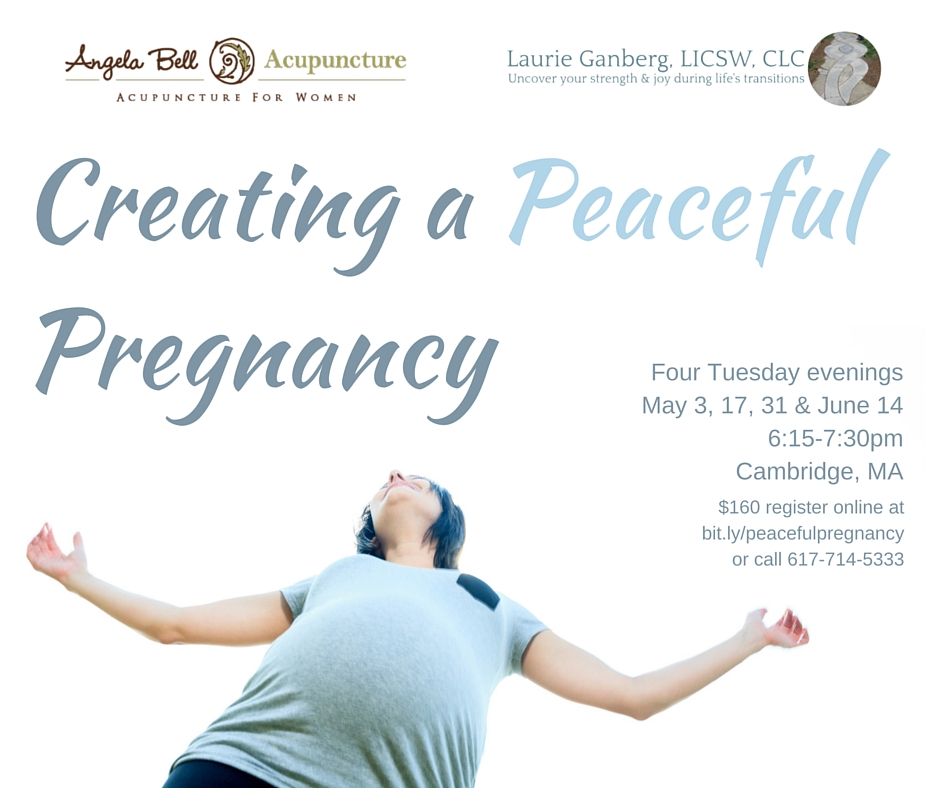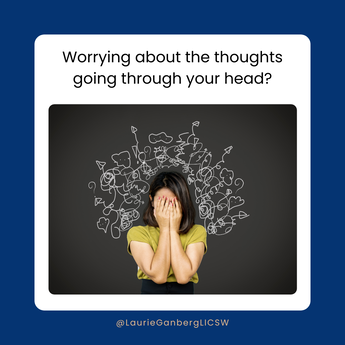
Intrusive thoughts continue to be one of the most challenging symptoms I see people experience in pregnancy, postpartum, and beyond. It's so easy to misunderstand them, few people talk about them, and these sticky thoughts often center on the very things that most upset us.
I'm going to share more information for partners/family members and for therapists in future posts, but to start with, here are five quick facts that might help you understand what's going on if you're experiencing intrusive thoughts.
If you're experiencing significant distress or worry about your intrusive thoughts, you can feel better. And as scary as it seems, talking to someone who understands perinatal intrusive thoughts is a good place to start. If you're not sure who that is in your life, contact the Postpartum Support International HelpLine at 1-800-944-4773.
If you feel like you're in crisis, you can call 988 to be connected to your local crisis team. There's also the 24/7, confidential Maternal Mental Health Hotline: 1-833-943-5746. Book Resources:
I participate in an Affiliate program with Bookshop.org, an online bookstore "with a mission to financially support local, independent bookstores." A purchase from my link will pay me a small commission, and gives a matching percentage to independent bookstores. You can view my Bookshop "shop" here: https://bookshop.org/shop/laurieganberglicsw. These recommendations do not constitute medical advice or a therapeutic relationship.
This group will be a chance to gather with and get to know a small group of other pregnant women while learning -- and practicing -- a number of strategies that can help you create more peace in your pregnancy, birth, and motherhood. You can read more about the group here.
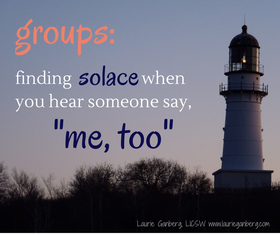 For the first time mother, a new moms group can be an anchor during long days of on-demand feedings and unpredictable naps. It's a commitment outside the house. No one cares if there's spit up on the baby's (or your) outfit. And you can find reassurance that others are going through the same challenges, while hearing from the experienced moms of babies a few months older that it does in fact get better - or at least change. Groups combat the stir-crazy. When your mind immediately imagines getting into an accident every time you put your baby in his car seat; when the pure physical ache of grief floods you each time you try to stand up; when you are facing yet another roller coaster month of hope and despair and anger; when you can't stop yourself from yelling at your child you can feel enveloped in a fog of isolation.
For these individuals dealing with postpartum emotional complications, loss, infertility, parenting challenges—and so many more issues—a support group can be a lifeline. The mere act of being in a room with others fights that isolation. In a group, you hear that others have said/thought/felt/done similar things. They nod, they pass the tissues, they laugh with you, and their eyes tear up because they recognize your story. Sometimes you have the perfect resource or a "been there done that" to share that helps someone else. Sometimes you just want to go to report a great success. You can leave a support group more confident, less alone, with a tiny bit less stress, with an idea to implement, simply lighter after a good cry or a vent or a laugh. You can find solace in a group. Resources:
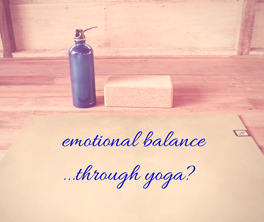 Last weekend, I was at a workshop with Bo Forbes entitled "Yoga for Emotional Balance: Simple Practices to Help Relieve Anxiety & Depression." To be honest, I'm not entirely sure yet what and how I might incorporate the workshop into my own life and into my clinical practice, but I wanted to share some initial thoughts. There were some ideas which seemed relatively straightforward:
These ideas fit with my frameworks for depression, anxiety, trauma, and the nervous systems. And they seem relatively accessible to share with the women, men, and adolescents with whom I work. Certainly any practice that encourages people to inhabit their body with conscious and compassionate attention is beneficial - especially when I think about women who've experienced birth traumas or losses, clients with chronic pain, or adolescents with body image struggles. Other aspects of the training elicited more bewildering discomfort. But to paraphrase Forbes: awkward is good; awkward is where the learning happens. So, I'm still mulling over interoception (briefly, this means the sense of the physiological condition of the body), the enteric nervous system in the gut, and how shifting visceral (or, body-based) resilience to change through slow, deliberate movement actually affects emotional resilience. I'm excited to integrate some of these concepts in my learning and practice. I think that there are also some valuable connections to make with new research about the role of inflammation, depression, and the consequences for perinatal mental health. And I'm feeling quite grateful for the opportunities that I have to go and take workshops outside my comfort zone and learn from other communities! Here's a quick little video of Bo Forbes talking about the nervous system - not from the training I went to, but it gives a sense of her framework.
I'd love to hear your thoughts in the comments, particularly if you're a clinician incorporating more body-based interventions in your practice. 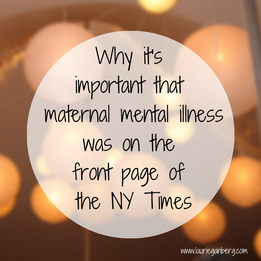 On 6/16/14, the NY Times published two articles on maternal mental health. This was above the fold, front-page media coverage for the emotional complications that mothers face. Let's talk about the cover story: 'Thinking of Ways to Harm Her': New Findings on Timing and Range of Maternal Mental Illness. First, a quick point about language. I don’t love that the headline led with the attention-grabbing reference to intrusive thoughts of harming a baby. And the article fell into the pattern of referencing either “postpartum depression,” which it makes the point of saying doesn’t accurately encompass the range of experiences, or “maternal mental illness,” which can come across as very medical. But the alternatives, like "perinatal mood disorders" or "emotional complications" have their limitations as well. So, I try to use a range to best speak to women's experiences. But back to the article... Women and families shared their experiences with depression, intrusive thoughts, and anxiety, demonstrating incredible vulnerability and courage. Writer Pam Belluck discussed the new research that backs up what clinical experience tells us: that emotional complications often start in pregnancy and are not easily identified as "just” depression, but frequently include overlapping features of depression, anxiety, obsessive compulsive disorder, and bipolar disorders. She touched on some of the factors that are associated with these experiences, the prevalence, and the range in timing when symptoms arise (during pregnancy and throughout the postpartum year). And there was mention of treatment: medications, therapy, support groups, and help to address impacts on bonding and attachment, though I wish there was more exploration of what treatment looks like for women and families. Belluck highlighted efforts to increase screening for postpartum mood disorders and the frustrating fact that more screening does not necessarily mean improved health: "A study in New Jersey of poor women on Medicaid found that required screening has not resulted in more women being treated...the law educated pediatricians and obstetricians, but did not compensate them for screening." In Massachusetts I am thankful that in Massachusetts we are taking some steps to increase screening. A 2010 law authorized the Department of Public Health to "develop a culture of awareness, de-stigmatization, and screening for perinatal depression." But changing a culture and eliminating stigma take time. Even if they are given a questionnaire, new moms often hide the truth of how they're feeling from their doctors and pediatricians out of shame and fear of judgment. And an OB who sees a woman for a mere 15 minute follow up appointment at 2 or 6 weeks postpartum may feel reluctant to ask further questions because they're unsure of where or to whom they would even refer her. The Massachusetts Child Psychiatry Access Project (MCPAP) aims to address some of these barriers by expanding its focus to include maternal mental health. Starting next month, doctors will be able to call a toll-free number to speak to a care coordinator to help find a mental health provider for their patient. MCPAP for Moms will be a great resource for doctors, but what about for mothers, their partners and families, and other providers? Granted there are some resources like the Massachusetts Postpartum Support International warmline (866-472-1897) and regional and community task forces creating systems of care for maternal mental health, but there are still gaping cracks women and families can fall through. What I’m most hopeful about in Massachusetts is a relatively small pilot project focused on preventing postpartum depression by putting postpartum doulas who can provide support and screenings in a few community health centers. A friend and colleague, Divya Kumar, Sc.M., is a certified postpartum doula and certified lactation counselor who works in one of these community health centers. Excited about the integration of services to address maternal health, Kumar says, “We need to change the way we do this...it's not just about preventing postpartum depression, but it's about promoting postpartum wellness and overall emotional health in new moms.” When a new mom brings her baby in for his well baby visit, Kumar is able to spend time with her helping with breastfeeding challenges, screen her for postpartum depression, and if needed, refer her to the mental health clinician down the hall who can see her that same day. And this is true even if the mother is not a patient of the health center. Plus, the community health center has midwives who also provide prenatal care so there’s the possibility for connection during pregnancy – important for the women who experience depression and anxiety during pregnancy and/or those who have a known mental health history. "Timely screening for perinatal emotional complications can save lives—especially in a community health center lucky enough to have comprehensive postpartum support AND mental health services right under one roof. [I am] so thankful for this pilot money and for centralized, accessible services," says Kumar, "We are offering services to families where the baby is seen at the clinic even if mom is not...We have caught a couple cases of PPD that way--huge, huge victories!" Until this pilot project can be replicated to reach more women, a woman (or someone in her family) needs the knowledge to recognize that what she's feeling isn't just new mom exhaustion, the courage to ask for help, and the resources to be able to find/afford/get to treatment. On top of all that, treatment must be specialized, connected to community-based supports, and welcoming. Dr. Kozhimannil, quoted in the article, speaks to the barriers: "There are also not enough treatment options…If a woman comes with a baby, and it’s a place treating people with substance abuse or severe mental illness, she may be uncomfortable.” (And yet, let's not forget that these are not mutually exclusive groups). When everything falls into place, it works. Timely, accessible treatment can help. As Jeanne Marie Johnson was quoted saying, once she received help, “It’s just a whole world of difference.” When I was looking for my office space, I thought about what it would be like for pregnant or new moms coming to see me. I looked for an office with an elevator, easy bathroom access, and parking. A chair that rocks for a breastfeeding mother, a hidden box of toys to distract an infant, water or a cup of tea to offer some comfort and hydration: these are all small ways I hope that the environment welcomes pregnant women and new mothers. And my connections to other resources—psychiatrists, acupuncturists, sleep consultants, lactation counselors, groups—form the foundation of a potential community of support for isolated new mothers and families. Ultimately, national media coverage of perinatal emotional complications like these NY Times articles helps to decrease isolation and stigma. I hope that this leads to more screening, more treatment, and more health for mothers and families. A bow of gratitude to the women who shared their stories and to Pam Belluck for writing these pieces. What's your take on the article? Please share in the comments. 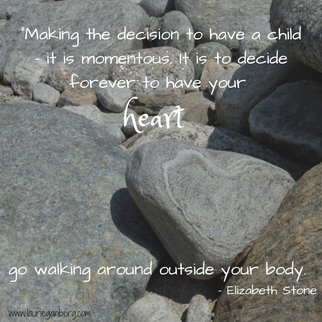 There are a lot of surprises when it comes to babies: how much noise tiny newborns can make; the volume of laundry; how many thousands of photos of a sleeping baby can end up on your phone/camera. But I hear from a lot of new mothers that they are taken aback by the anxious thoughts. And then they start worrying about how much they're worrying. It's a tough, but easy, spiral to fall into. Any of this sound familiar?
 Here are three strategies to help get you out of your head:
However, if strategies like these aren't cutting it; if you're having panic attacks; if the constant stream of thoughts in your head is keeping you awake even while the baby's asleep; if you're avoiding activities like bath time or not going particular places because of fear, you might need some extra support to feel better. Between 10-15% of women in the postpartum period will experience depression or anxiety. That's nearly 1 in 6. In my experience with new moms, the symptoms of anxiety are some of the most common. So here's what I want to make sure you hear: It's not your fault - it's not because of anything you did or didn't do. You are a good mother. And the even better news? You can feel like yourself again. How? First off, if the thought of "doing" anything else feels overwhelming right now, enlist help. Your partner, a friend, a family member can take care of the logistics. Unsure how to ask for help? Email them this post. If a new mother sent this to you, tell her you love her, she's a good mother, and you will help her with these next steps.
Have you made it to the other side of postpartum anxiety? What helped you? Please share in the comments. "Stone Heart" (http://bit.ly/1onQYe5) by Irene Grassi is licensed under CC BY-SA 2.0. |
Therapy, Groups, Supervision, Consultation, Training in Seattle, WA and online in Washington state
Laurie Ganberg, LICSW, PMH-C (#LW60673320) ~ Specializing in Perinatal Mental Health, Trauma, & Fat Liberation
Now practicing through Fiddlehead Therapy, PLLC with online services and in person in Mountlake Terrace, WA
Home | Privacy | Contact | Zoom Link
© 2019-2024 All rights reserved
Laurie Ganberg, LICSW, PMH-C (#LW60673320) ~ Specializing in Perinatal Mental Health, Trauma, & Fat Liberation
Now practicing through Fiddlehead Therapy, PLLC with online services and in person in Mountlake Terrace, WA
Home | Privacy | Contact | Zoom Link
© 2019-2024 All rights reserved

